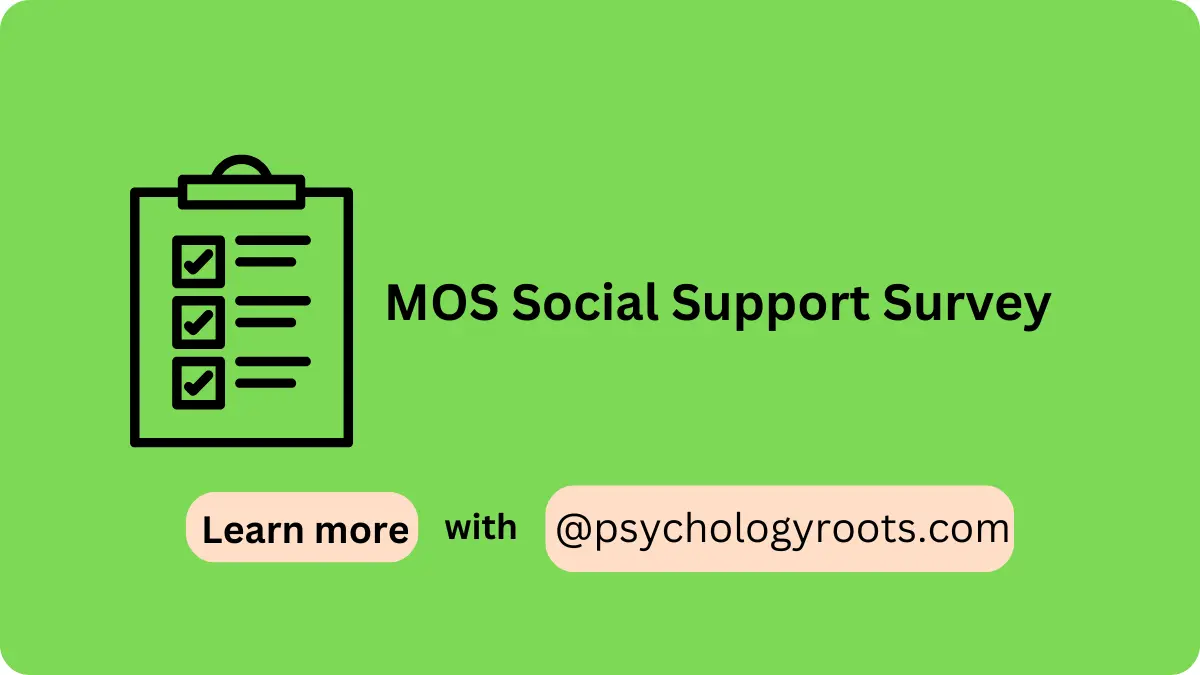Table of Contents
MOS Social Support Survey
Here in this post, we are sharing the “MOS Social Support Survey”. You can read psychometric and Author information. We have thousands of Scales and questionnaires in our collection (See Scales and Questionnaires). You can demand us any scale and questionnaires related to psychology through our community, and we will provide you with a short time. Keep visiting Psychology Roots.
About MOS Social Support Survey
Scale Name
MOS Social Support Survey
Author Details
Cathy D. Sherbourne and Anita L. Stewart
Translation Availability
English

Background/Description
The MOS Social Support Survey (MOS-SSS), developed by Cathy D. Sherbourne and Anita L. Stewart in 1991, is a 19-item self-administered scale designed to measure the perceived availability of functional social support in adults, primarily those with chronic illnesses, but also applicable to general population samples. Published in Social Science & Medicine (1991), it is part of the Medical Outcomes Study (MOS) and focuses on functional support (perceived availability) rather than structural support (e.g., network size) or received support, which may reflect need rather than availability. The scale assesses four dimensions: Tangible Support (4 items: e.g., material aid), Affectionate Support (3 items: e.g., love, empathy), Positive Social Interaction (4 items: e.g., companionship), and Emotional/Informational Support (8 items: e.g., guidance, feedback). A single structural item (number of close friends/relatives) is included but not scored in subscales.
Each item is rated on a 5-point scale (1 = none of the time, 5 = all of the time) based on how often support is available. Subscale scores are summed and rescaled to 0–100 (higher scores = more support); a total score is the mean of subscale scores, though subscale scores are preferred. The MOS-SSS was validated with ~2,987 adults (mean age ≈ 40–65 years, mixed gender, U.S.-based, MOS participants with chronic conditions). It correlates with loneliness (r = -0.53 to -0.69) and mental health (r = 0.36–0.45). The survey is used in clinical psychology, public health, and chronic disease research to assess social support’s role in coping with stress or illness.
Administration, Scoring and Interpretation
- Obtain the MOS-SSS from Sherbourne & Stewart (1991) or RAND Health (rand.org), ensuring ethical permissions.
- Explain to participants (adults 18+ with chronic illness or general population) that the survey assesses perceived availability of social support, emphasizing confidentiality and voluntary participation.
- Administer the 19-item scale via self-report in survey, clinical, or community settings, asking about support availability over recent weeks.
- Estimated completion time is 5–10 minutes.
- Ensure a private, supportive environment; provide mental health or chronic illness resources (e.g., support groups) and adapt for accessibility (e.g., large print, oral administration) if needed.
Reliability and Validity
The MOS-SSS demonstrates robust psychometric properties (Sherbourne & Stewart, 1991). Internal consistency is high (Cronbach’s alpha = 0.97 overall, 0.91–0.96 for subscales, N ≈ 2,987). Item-scale correlations exceed 0.72. One-year test-retest reliability is strong (r = 0.78 overall, 0.72–0.76 for subscales).
Convergent validity is supported by correlations with loneliness (r = -0.53 to -0.69), marital/family functioning (r = 0.38–0.57), and mental health (r = 0.36–0.45). Discriminant validity is evidenced by lower correlations with physical symptoms (r = -0.14 to -0.30), role limitations (r = -0.14 to -0.30), and pain severity (r = -0.14 to -0.21). Factor analysis confirms a single overall index and four distinct subscales (inter-subscale correlations = 0.69–0.82). The structural item (number of close friends/relatives) shows low correlations with subscales (r = 0.18–0.24). Pairing with the SF-36 or Social Support Questionnaire enhances comprehensive assessment.
Available Versions
20-Items
Reference
Sherbourne, C. D., & Stewart, A. L. (1991). The MOS social support survey. Social science & medicine, 32(6), 705-714.
Important Link
Scale File:
Frequently Asked Questions
What does the MOS Social Support Survey measure?
It measures perceived availability of tangible, affectionate, positive social interaction, and emotional/informational support.
Who is the target population?
Adults (18+) with chronic illnesses or in general population surveys.
How long does it take to administer?
Approximately 5–10 minutes.
Can it inform interventions?
Yes, it assesses social support to guide stress management and chronic illness interventions.
Disclaimer
Please note that Psychology Roots does not have the right to grant permission for the use of any psychological scales or assessments listed on its website. To use any scale or assessment, you must obtain permission directly from the author or translator of the tool. Psychology Roots provides information about various tools and their administration procedures, but it is your responsibility to obtain proper permissions before using any scale or assessment. If you need further information about an author’s contact details, please submit a query to the Psychology Roots team.
Help Us Improve This Article
Have you discovered an inaccuracy? We put out great effort to give accurate and scientifically trustworthy information to our readers. Please notify us if you discover any typographical or grammatical errors.
Make a comment. We acknowledge and appreciate your efforts.
Share With Us
If you have any scale or any material related to psychology kindly share it with us at psychologyroots@gmail.com. We help others on behalf of you.